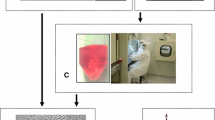Abstract
Aims and Objectives
The purpose of this study was to compare the potential effects of pedunculated and free synovial grafts in the repair of full-thickness articular cartilage defects on an animal model with histological and immunohistochemical analysis.
Materials and Methods
A comparative study in an animal model was performed with 24 rabbits, divided into two groups. Full-thickness cartilage defects were created bilaterally on the knees of all rabbits. Pedunculated and free synovial grafts were applied to the right knees of Group 1 and Group 2, respectively. Left knees were left as the control group. Six rabbits from each group were randomly selected for euthanasia 4 and 8 weeks postoperatively. All samples were examined histologically with a cartilage scoring system. For immunohistochemical analysis, the degree of collagen 2 staining was determined using a staging system. All data were statistically compared between the study groups with Student’s t-test or Mann–Whitney U-test. The correlations between categorical variables were analyzed with Fisher’s exact test and Chi-square test.
Results
In Group 1, the mean defect size had significantly decreased at 8 weeks postsurgery. It was also significantly smaller than that of Group 2. Both pedunculated and free synovial grafts had significantly better histological and immunohistochemical outcomes compared with the controls. Contrastingly, the results of comparison between the study groups (Group 1 vs. 2) at the 4th and 8th week were not statistically significant with regard to histological scores and immunohistochemical staining.
Conclusion
Synovial tissue, whether pedunculated or free, provided much better cartilage recovery compared with the control. It can be used as a mesenchymal stem cell (MSC) source, and synovium-derived MSCs have the chondrogenic potential for the in vivo treatment of full-thickness cartilage defects.




Similar content being viewed by others
References
Redondo ML, Naveen NB, Liu JN, Tauro TM, Southworth TM, Cole BJ. Preservation of knee articular cartilage. Sports Med Arthrosc Rev 2018;26:e23-30.
Welton KL, Logterman S, Bartley JH, Vidal AF, McCarty EC. Knee cartilage repair and restoration: Common problems and solutions. Clin Sports Med 2018;37:307-30.
Hunziker EB, Rosenberg LC. Repair of partial-thickness defects in articular cartilage: Cell recruitment from the synovial membrane. J Bone Joint Surg Am 1996;78:721-33.
Tuncay IC, Ozdemir BH, Demirörs H, Karaeminogullari O, Tandogan NR. Pedunculated synovium grafts in articular cartilage defects in rabbits. J Invest Surg 2005;18:115-22.
Getgood A, Bhullar TP, Rushton N. Current concepts in articular cartilage repair. Orthop Trauma 2009;23:189-200.
Rodrigues MT, Gomes ME, Reis RL. Current strategies for osteochondral regeneration: From stem cells to pre-clinical approaches. Curr Opin Biotechnol 2011;22:726-33.
Rutgers M, van Pelt MJ, Dhert WJ, Creemers LB, Saris DB. Evaluation of histological scoring systems for tissue-engineered, repaired and osteoarthritic cartilage. Osteoarthritis Cartilage 2010;18:12-23.
Nagura I, Fujioka H, Kokubu T, Makino T, Sumi Y, Kurosaka M. Repair of osteochondral defects with a new porous synthetic polymer scaffold. J Bone Joint Surg Br 2007;89:258-64.
Hunziker EB. Growth-factor-induced healing of partial-thickness defects in adult articular cartilage. Osteoarthritis Cartilage 2001;9:22-32.
Ivirico J, Bhattacharjee M, Kuyinu E, Nair L, Laurencin CT. Regenerative engineering for knee osteoarthritis treatment: Biomaterials and cell-based technologies. Engineering 2017;3:16-27.
Kim MJ, Son MJ, Son MY, Seol B, Kim J, Park J. Generation of human induced pluripotent stem cells from osteoarthritis patient-derived synovial cells. Arthritis Rheum 2011;63:3010-21.
Labusca L, Zugun-Eloae F. Stem cell therapy for the treatment of cartilage defects and osteoarthritis. Bone and Cartilage Regeneration. Springer International Publishing: Switzerland; 2017. p. 11-45.
Miyamoto A, Deie M, Yamasaki T, Nakamae A, Shinomiya R, Adachi N. The role of the synovium in repairing cartilage defects. Knee Surg Sports Traumatol Arthrosc 2007;15:1083-93.
Wakitani S, Goto T, Pineda SJ, Young RG, Mansour JM, Caplan AI. Mesenchymal cell-based repair of large, full-thickness defects of articular cartilage. J Bone Joint Surg Am 1994;76:579-92.
Buma P, Pieper JS, van Tienen T, van Susante JL, van der Kraan PM, Veerkamp JH. Cross-linked type I and type II collagenous matrices for the repair of full-thickness articular cartilage defects – A study in rabbits. Biomaterials 2003;24:3255-63.
Han CW, Chu CR, Adachi N, Usas A, Fu FH, Huard J. Analysis of rabbit articular cartilage repair after chondrocyte implantation using optical coherence tomography. Osteoarthritis Cartilage 2003;11:111-21.
Rudert M, Wilms U, Hoberg M, Wirth CJ. Cell-based treatment of osteochondral defects in the rabbit knee with natural and synthetic matrices: Cellular seeding determines the outcome. Arch Orthop Trauma Surg 2005;125:598-608.
Hui JH, Chen F, Thambyah A, Lee EH. Treatment of chondral lesions in advanced osteochondritis dissecans: A comparative study of the efficacy of chondrocytes, mesenchymal stem cells, periosteal graft, and mosaicplasty (osteochondral autograft) in animal models. J Pediatr Orthop 2004;24:427-33.
Keeney M, Lai JH, Yang F. Recent progress in cartilage tissue engineering. Curr Opin Biotechnol 2011;22:734-40.
Lee JC, Min HJ, Park HJ, Lee S, Seong SC, Lee MC. Synovial membrane-derived mesenchymal stem cells supported by platelet-rich plasma can repair osteochondral defects in a rabbit model. Arthroscopy 2013;29:1034-46.
Narayanan G, Bhattacharjee M, Nair L, Laurencin C. Musculoskeletal tissue regeneration: The role of the stem cells. Regen Eng Transl Med 2017;3:133-65.
Funding
Nil.
Author information
Authors and Affiliations
Corresponding author
Ethics declarations
Conflicts of interest
There are no conflicts of interest.
Rights and permissions
About this article
Cite this article
Haberal, B., Sahin, O., Terzi, A. et al. Treatment of Full-Thickness Cartilage Defects with Pedunculated and Free Synovial Grafts: A Comparative Study in an Animal Model. JOIO 54, 720–725 (2020). https://doi.org/10.1007/s43465-020-00067-w
Published:
Issue Date:
DOI: https://doi.org/10.1007/s43465-020-00067-w




